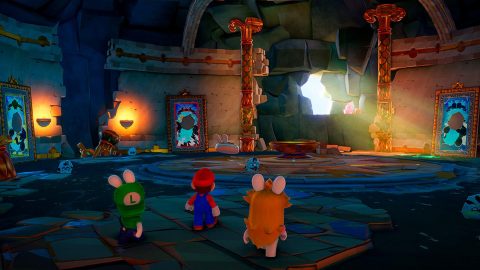
This Week in Games is a weekly column where Vikki Blake pulls apart the biggest stories in gaming each week. This week, she considers the impact of an “NFT console” on the industry, gamers, and the environment.
It’s hard to know what’s more obnoxious about Polium One; the name, the fact it’s a “multi-chain” gaming “NFT console”, or its creators’ patronising response to player feedback.
On July 2 – the same day The Guardian ran a piece saying “NFT sales hit a 12-month low after cryptocurrency crash” – it was unveiled as a new “Web 3 gaming” console coming out in 2024. Although it couldn’t share a prototype or announce any titles coming to the new system, its social media channels promise “exclusive games”, insists the team “has experience in hardware and software”, and says, rather ominously, that the founders “will not stop”.
It also said that whilst there’s currently no CD drive, “maybe one day [it] will partner up with Netflix if they want to build a blockchain version of their app”. Balls in your court, Netflix.
No CD drive but maybe one day we will partner up with Netflix if they want to build a blockchain version of their app
— Polium (@Polium__) July 4, 2022
Rather than spend time getting us on side, the social media team – if there is one, and I’m not convinced – has been busy defending its logo (it looked so suspiciously familiar to the Gamecube’s one that two days later it was changed), and, more recently, threatening to ban members of its own Discord.
If you’re blissfully ignorant about NFTs, I pray you stay that way, but for the uninitiated, NFTs – “Non-Fungible Tokens” – are “unique” digital assets that can sell for pennies or thousands of pounds. In some instances – perhaps most notably in music and the arts – they’re seen as a way of letting fans “own” digital assets to support, say, their favourite artists.
A more cynical view – particularly in the gaming world – is that they’re insidious and predatory, which is saying something given the industry is awash with microtransactions that are already pretty exploitative.
But even sidestepping the predatory argument, blockchain requires huge amounts of energy, particularly when “mining” cryptocurrencies. Some will say they’re carbon-neutral or even carbon-negative, often by planting trees to “offset” the environmental impact… but as those need to grow over several years before they’re able to offset the damage in any meaningful way, detractors remain unconvinced.
sigh pic.twitter.com/I4PIQB6o1H
— AGGRO CRAB (@AggroCrabGames) January 31, 2022
And if you needed a sign that there’s nothing good about NFTs for gamers, just look at how the world’s biggest publishers are salivating at the chance of shoehorning them into established games and franchises. Sega, Square Enix, Ubisoft, Konami, EA, Team17; Each of those publishers have either already launched NFTs or have said they think they are “the future”. Several have had to u-turn or backtrack plans after fans – and in some instances, staff – hit back. Not all of them have, though; not by a long shot.
The trouble with NFTs, and Polium particularly, is the thick layer of arrogant condescendence that sits over everything. Any negativity must be because we don’t understand it. Any backlash is because we’re thick, not because we think owning a digital facsimile of something is stupid. Instead of trying to win us over, Polium is doubling-down, as is painfully apparent in its follow-up statement.
“We have been receiving FUD [fear, uncertainty, and doubt] and criticism regarding our ability to execute,” its follow-up statement kicks off, assuming our collective angst is about their ability to “execute” rather than the idea of a shitty NFT console itself.
“To clarify, it’s four of us that are building the functional prototype for the console and controller.”
It takes console giants 5+ years because they are console giants. They have a reputation and must get approval from multiple departments and key investors through the hardware development process. Also, they need exclusive games, which takes more time.
— Polium (@Polium__) July 4, 2022
I’m sorry: did you say four? Is that supposed to make us feel better about the project? Its defence of the quick hardware development cycle is not the win it thinks it is, either:
“It takes console giants 5+ years because they are console giants,” it says. “They have a reputation and must get approval from multiple departments and key investors through the hardware development process. Also, they need exclusive games, which takes more time.”
So: you’re saying you don’t care about reputation? You don’t have key investors? And you don’t have exclusive games? ‘Kay. Gotcha.
The Polium One controller will reportedly have a fingerprint scanner and a wallet button – you know, to make sure there are as few barriers as possible between your cash and crypto-bros’ desire to squeeze you for more of it – and a “functional prototype” will be out before November. The console itself will be pre-ordered by – you’ve guessed it – an NFT called “Polium Pass” which will be limited to 10,000.
1⃣ We did not copy the Nintendo’s GameCube logo. There are multiple companies that are using a similar logo. But we will illustrate a new logo that is original.
— Polium (@Polium__) July 4, 2022
There is some recognition of the kind of things gamers want – the console will reportedly offer ray tracing and 8K HDR at 120fps – but how in the hell they achieve that remains to be seen.
“The console will be powerful enough to run high-performance games and will be easy to use for a traditional gamer who doesn’t understand Web 3,” Polium insists. “There will be games on the console, and we will make some announcements soon. We are currently speaking to game developers.”
What games those will remain to be seen, and my gut says some of the companies I listed above may be more interested in the new system than we may like.
But let’s be clear: Polium One is a console we haven’t seen, running games it hasn’t confirmed, for an unannounced price, releasing at an unspecified time, via virtual currency renowned for scams and theft. And while we all know a fool and their money are soon parted – I bought Google Stadia, my friend – even this fool won’t be shelling out for this one.
If you enjoyed Vikki Blake’s round-up of this week’s grimmest NFT story, catch up on the rest of this month’s news with This Week In Games.
The post If game publishers are excited about NFTs, we probably shouldn’t be appeared first on NME.








